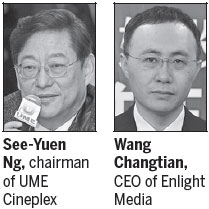Toxic air found inside country's cinema business bubble
Updated: 2016-08-01 07:50
By Raymond Zhou(China Daily)
|
|||||||||
There are many forces driving the hectic growth of China's film market and not all of them are encouraging. Subsidy and phantom tickets are two of the shady practices that have been blamed for inflating a bubble.
Subsidy tickets, which are technically legal, comes from businesses desiring to lock in the film patrons by paying for part of the ticket prices. Online ticketing services have been the most prominent players in this field.
For the busy National Day season around Oct 1 last year, as much as 20 percent of the box-office total came from subsidies, some experts estimated.
When it comes to a particular ticket, the ratio of subsidy could be much higher. For example, all those 9.9-yuan ($1.50) tickets are heavily subsidized, with a third party paying two-thirds or even three-quarters of the regular price. (An average ticket nationwide costs 34 yuan. In Beijing it's as much as 45 yuan, the highest in China.)
The money for the subsidy eventually comes from funds raised by venture capitalists or the stock market. It is offset by an enlarged customer base and, hopefully, by a corresponding spike in corporate valuation.

On a positive note, subsidy tickets have made online ticketing commonplace. As much as 65 percent of all movie tickets were bought online. One Wanda cinema in Changchun, Jilin province, registered a record 93 percent for online sales.
Of the 44 billion yuan in 2015's box-office figure, roughly four to five billion was contributed from this kind of subsidy, which corresponds to the industry consensus of 10 percent, according to Wang Changtian of Enlight.
Most industry insiders hold a negative view of the subsidy system. Audience members, many of whom are new to the cinema experience, will be less likely to accept normal, reasonable pricing after they've been conditioned to dirt-cheap rates.
"There should not be 9.9-yuan tickets," said See-Yuen Ng, chairman of UME Cineplex and a veteran filmmaker originally from Hong Kong. "Ticketing services worldwide charge a service fee and the ticket prices remain the same across the board."
He said that during the 2016 Chinese New Year he had agreements with online ticketing agencies that no tickets would be sold below the minimum prices set by cinemas, but "in reality no one abided by the agreement".
The impact of the ticket subsidies can also be seen in the practices of some small and independent cinemas that offer ultralow rates, such as 15 yuan apiece, when no subsidy is available.
With a subsidized ticket, the sum received by the cinema is never lower than the legally bound minimum, but a 15-yuan ticket can't even be printed out of the computer, Ng said, so the cinema simply pockets the whole amount without repatriating the legally set portion to the film companies. And patrons would not report it because they would simply think the price was subsidized.
When splurging for real patrons doesn't generate enough customers, an even more audacious - and legally suspicious - practice has been adopted by some. They will pay for blocks of seats without bothering to put people into them.
The practice, which can be detected easily by amateur sleuths, who can compare online real-time seating diagrams with the actual screening room, is said to be widespread among some film companies, who use it to create an illusion that the movie is more popular than it actually is.
While most used the phantom attendance to attract real ticket buyers down the road, the tipping point occurred in March when Shanghai-based Kuailu Investment Group, the mainland distributor for Ip Man 3, employed this gimmick to jack up their stock price rather than to generate attendance.
Swift action taken by the government regulator threw cold water on the practice. The flood of outside capital into the film industry is now viewed with more suspicion, as many believe investors are in it for a quick buck and don't care if growth comes at the expense of industry health.
"When people use the film business as they do speculation in the stock market, that's bad for our industry," said Ng of UME. "So many people are injecting air into the bubble that there'll be dire consequences when it bursts."
"Subsidies have run their course. They're not sustainable," said Enlight's Wang. "Our industry is not yet in a position of strength. The profit margins are thin. Now that subsidies have faded out, we'll have a clearer picture of the purchasing power of our customers, which, as we're now more aware, is not limitless."
raymondzhou@chinadaily.com.cn
(China Daily 08/01/2016 page4)
Today's Top News
Ukraine's Savchenko on hunger strike
Chinese tourists robbed in France
5 feared dead as Russian helicopter shot down
China influence can soften blow of Brexit
Turkey summons German diplomat over Cologne rally
Khan parents chide Trump for lack of empathy
Lunar probe confirms no water on the moon
'China's Challenges' wins historic Emmy Award
Hot Topics
Lunar probe , China growth forecasts, Emission rules get tougher, China seen through 'colored lens', International board,
Editor's Picks

|

|

|

|

|

|







